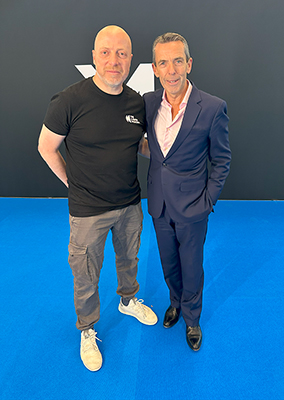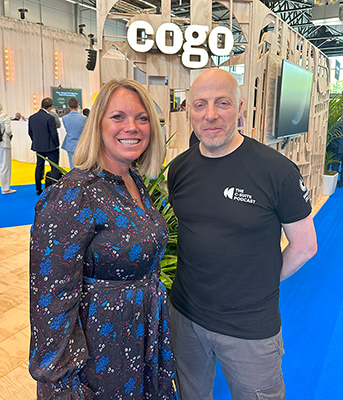Ian Stuart, CEO, HSBC UK
Ian Stuart, CEO at HSBC UK, discussed recent developments and HSBC UK’s acquisition of Silicon Valley Bank UK, which took place over a weekend in March 2023 for the price of £1.

Russell Goldsmith with Ian Stuart, CEO, HSBC UK
He recounted the timeline, starting with the movement of deposits on Friday and the subsequent discussions with the Bank of England on Saturday morning. The intensity of activities peaked on Sunday, with access to the data room, rigorous due diligence, and crucial decision-making.
When asked about the stressfulness of the weekend, Ian reflected that the Saturday was very stressful as he thought “why is nobody speaking to me? We’re really trying to help here.” And then the Sunday was an intense but manageable day, thanks to the support of his team. He also acknowledges the involvement of Noel Quinn, HSBC’s Group Chief Executive, and the series of board meetings held to gain approval for the acquisition.
Regarding the strategic importance of the acquisition, Ian characterizes it as an opportunistic move that positions HSBC to gain industry knowledge, exceptional talent, and a strong book of business. He highlighted the plan to integrate Silicon Valley Bank UK’s operations and expand the bank’s services from seed funding to IPO, eliminating the need for external resources. Additionally, Ian expressed excitement about the potential for rapid global expansion, mentioning recent hiring efforts in the US and Israel.
Shifting gears, Russ asked about macro trends in the market, where Ian acknowledged the recent softening of the market and predicted that it may take around 12 months for a significant recovery.
However, he remained confident in the market’s eventual resurrection, likely to occur in the second half of 2024.
Lastly, the conversation turned to the role of AI at HSBC. Ian observed that AI has become pervasive and highlighted the potential to leverage it in banking operations. He specifically discussed the opportunity to automate manual tasks using AI technology, enabling employees to focus on more valuable customer interactions. Ian provided an example of streamlining the annual review process for businesses, resulting in time savings for relationship managers.
HSBC has since announced the rebrand of SVB UK to HSBC Innovation Banking.
 Ugne Buraciene, Group CEO, payabl.
Ugne Buraciene, Group CEO, payabl.
Ugne Buraciene, is the Group CEO of payabl, a Paytech fintech company specializing in providing comprehensive financial services for merchants. She explained that payable. offers a wide range of services for merchants, including acquiring payment services, alternative payment methods, banking issuing, and POS terminals.

Ugne Buraciene with Romy Wilson
Ugne was moderating a session at Money20/20 with guests from Lloyds Banking Group and PPRO to discuss what merchants need to do to improve payments. She emphasized the importance of focusing on what merchants can do to enhance their payment processes, as there is often a primary focus on what payment service providers can do. According to Ugne, leaving payments as an afterthought is a common mistake made by merchants. Payments should be prioritized as a crucial part of the infrastructure, considering aspects such as security, payment acceptance, strategy, and alignment with the company’s values.
Ugne also announced the opening of a new office in Amsterdam for payable., stating that the Netherlands has a rich history in payments and offers potential partnerships. Payable. is in the process of obtaining a license in the Netherlands and is also expecting to receive an FCA license in the UK, which will further expand its presence in Europe and globally.
Radek Zaleski, Partner, Netguru
Radek Zaleski, is a partner at Netguru.

Radek Zaleski, Partner at Netguru
Radek was moderating a session on super apps, a topic previously covered on the show with Laura McCracken of Accenture at Money20/20 Vegas last year.
Radek provided an overview of super apps, describing them as integrating multiple functions into a core app to better serve the audience. However, he also acknowledged the controversial perception of super apps as bloated products with too many features, making them overwhelming and difficult to use. The debate in the panel was centred around whether super apps or separate banking apps were preferable for managing finances, considering their respective pros and cons.
According to Radek, the advantages of super apps include streamlined user experiences with a single login and a more focused UX for specific purposes. From a technical perspective, maintaining and ensuring coherence in super apps can be easier. However, driving user adoption and determining whether users desire multiple apps for different purposes remain challenges. The main drawback of super apps is the risk of losing track of the end user and creating a product that tries to serve everyone but ends up being useful to no one. Radek emphasised the importance of being mindful of customer needs and striking a balance between customer satisfaction and business objectives.
When it comes to designing or updating customer-facing apps, Radek highlighted the significance of empathising with end users and designing products with their needs in mind. He cautioned against letting business goals solely dictate the app’s appearance and functionality, using the example of irrelevant features being forcefully introduced in his own banking app. Radek stressed the importance of understanding user behaviour and carefully analysing signals from end users during the product development process.
Regarding Netguru’s role in the space, Radek explained that the company helps various institutions, including startups, unicorns, and legacy financial institutions, build such applications. They provide assistance by developing specific features or building complete products. With their 15 years of experience and expertise in developing apps for various industries, including financial services, Netguru can address challenges and problems more efficiently and bring valuable cross-industry insights to the table.
Looking at the future of the space, Radek expressed some pessimism about the prevalence of bloated applications driven by business interests rather than user-centric design. He described the experience of being bombarded with irrelevant features and functionalities that overshadow the app’s core purpose. However, he also expressed optimism, acknowledging the intelligence, and understanding of the people behind these products. Radek believed that finding the right balance between optimistic business units and those responsible for user satisfaction would lead to positive industry evolution.
Emma Kisby, CEO, EMEA, Cogo
Emma Kisby, is CEO, EMEA of Cogo, a company that promotes conscious consumerism by helping consumers understand the impact of their everyday spending on people and the planet.

Emma Kisby, CEO, EMEA, Cogo
Emma discussed her upcoming session at the event with Léon Wijnands, Head of Sustainability for the Netherlands at ING. The session titled “Future Banking Driving Consumer Change in the New Economy” focused on the transition to a green economy and the role of banks in promoting sustainability. Cogo and ING are working together to help consumers reduce their carbon emissions by providing insights into their carbon footprints.
When asked about what banks can achieve from carbon footprint management beyond tracking, Emma highlighted the engagement and impact it can create. Carbon tracking has proven to engage consumers, especially Gen Zs and millennials, and opens the opportunity for banks to offer financial products that support a low carbon lifestyle. Banks can support customers in transitioning to sustainable practices by providing financial assistance for initiatives such as home retrofits or electric vehicles.
Regarding the conscious consumer, Emma explained that consumers are increasingly looking for ESG commitments from banks and corporates. A significant portion of consumers would consider leaving their bank if it doesn’t demonstrate sustainability commitments. Banks need to integrate sustainability into their products, services, and overall customer experience to meet the expectations of conscious consumers.
Emma emphasized that carbon tracking is an effective way to engage consumers who may not yet be on the sustainability journey. By embedding carbon tracking in the mobile banking experience, consumers become aware of the carbon emissions associated with their everyday spending. This helps bridge the intention-action gap and enables consumers to understand the impact of their financial choices.
The conversation concluded with Emma discussing Cogo’s zero waste exhibition stand at the event. The company’s commitment to sustainability is reflected in the materials used for the stand, which are reused or recycled, creating a circular approach to waste management. Emma expressed hope that more stands like this will be seen at future events.
Oliver von Landsberg-Sadie, Founder & CEO, BCB Group
Oliver von Landsberg-Sadie, is the founder and CEO of BCB Group.

Oliver von Landsberg-Sadie, Founder & CEO, BCB Group
Oliver provided an introduction to BCB Group, which offers business accounts for the digital asset industry and specialises in FX OTC trading. These services address the critical infrastructure needs of a market that struggles to access basic banking services.
The discussion turned to the collapse of banks such as Silicon Valley Bank, Silvergate, and Signature Bank. Oliver highlighted that these banks experienced failures due to several factors, including structural issues, mismanagement of rising interest rates, regulatory scrutiny, and concentration of funds from the crypto industry. He mentioned that the crypto space faces both challenges and opportunities moving forward, as disruptive events lead to a purge of irresponsible behaviour and pave the way for higher quality companies to thrive.
Oliver explained the opportunities this situation presents for BCB Group. With partnerships with failed banks behind them, BCB Group is now well-equipped to provide dollar business accounts for the crypto industry. He announced a new partnership with Axos Bank, based in San Diego, which brings structure, governance, and risk distribution. BCB Group aims to establish multiple partnerships to ensure resilience and eliminate single points of failure, creating a better model for the crypto market.
Regarding the strategy and future plans, Oliver emphasised that these partnerships align with BCB Group’s distributed risk strategy. By demonstrating a resilient solution for managing complex money flow in the crypto space, BCB Group aims to be a long-term partner for the market, benefiting both parties.
Rebecca Dibb-Simkin, CMPO, Octopus Energy Group
Rebecca Dibb-Simkin is Chief Product and Marketing Officer at Octopus Energy Group.

Rebecca Dibb-Simkin, CPMO, Octopus Energy Group
Rebecca explained that she had a strong passion for innovation and found it fascinating to observe how different industries approached the same space. She discussed Octopus Energy’s journey from being a small startup with 40 employees and a shared office space to becoming a global company with operations in 14 countries and a platform serving 30 million customers. She also expressed excitement about connecting with startups and witnessing the early stages of their own journeys.
During her session at the conference, Rebecca elaborated on Octopus Energy’s positioning as a technology group and global energy company. Drawing inspiration from disruptive companies such as Amazon, Uber, and Tesla, she highlighted the Octopus Energy’s use of technology to enhance customer interactions and empower their team.
Octopus Energy’s overarching mission is to transition the entire planet to renewable energy aligned with its consumer-centric approach and utilization of a robust tech platform.
Mentioning the challenges Octopus Energy faced in recent years, including the COVID-19 pandemic, the war in Ukraine, and subsequent energy crises, Rebecca attributed the company’s positive position to their unique blend of technology and human expertise. She emphasised that Octopus Energy invested in their team during challenging times, avoiding layoffs, and even expanding their workforce. The company’s growth was evident from the staggering number of job applications they received, reaching 82,000 in the previous year. Rebecca explained the importance of focusing on talented individuals and leveraging their potential during tough periods.
This was the first Money20/20 that Rebecca had attended, and she expressed her excitement about the conference. She found the atmosphere to be exceptionally vibrant, with people daring to explore new ideas. As a consumer in the fintech sector, she felt inspired by the discussions surrounding how technology could simplify money management, mirroring Octopus Energy’s efforts in the energy industry.










